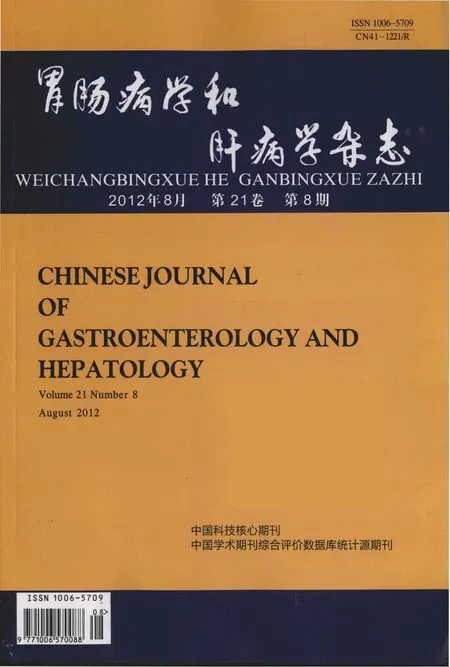英夫力西单抗治疗难治性溃疡性结肠炎
陆晓娟,盛剑秋,李恕军,范如英,王继恒,杨欣艳,付 蕾,王晓伟,李世荣
北京军区总医院消化内科,北京 100700
英夫力西单抗治疗难治性溃疡性结肠炎
陆晓娟,盛剑秋,李恕军,范如英,王继恒,杨欣艳,付 蕾,王晓伟,李世荣
北京军区总医院消化内科,北京 100700
目的 分析14例英夫力西治疗难治性中重度溃疡性结肠炎的临床资料,探索英夫力西治疗国人溃疡性结肠炎的效果和安全性。方法 对我院2006年-2011年经常规治疗失败的14例难治性中重度溃疡性结肠炎患者,行英夫力西单抗治疗,分别于0、2、6周按5 mg/kg全身用药,以后每8周给药1次,个别患者因用药效果、病情变化等增加了用药剂量或缩短了用药间隔。分析英夫力西单抗治疗8周有效率和缓解率,随访30周、54周缓解率及安全性等。结果 治疗8周有效率为42.9%,缓解率为42.9%,无效率为14.3%;随访30周、54周缓解率分别为57.1%和42.3%。有2例患者达到黏膜愈合,至今分别随访35个月和28个月,病情均无复发。不良反应发生率为28.6%,无严重或危及生命的不良反应发生。随访54周,有效组和无效组前两次英夫力西单抗治疗有效者所占比例差异有统计学意义(P=0.015)。结论 应用英夫力西治疗14例难治性中重度溃疡性结肠炎,取得了良好的治疗效果,前两次治疗有效可预示远期治疗效果好,近期的药物不良反应不影响程序性治疗的进行。英夫力西单抗可作为国人难治性溃疡性结肠炎的挽救治疗方法。
溃疡性结肠炎;英夫力西单抗;回顾性分析
溃疡性结肠炎(ulcerative colitis,UC)是一种易反复发作的慢性肠道炎性疾病,糖皮质激素是难治性中重度UC的首选药物,60%患者可达缓解,然而30% ~40%的患者存在激素抵抗或依赖[1-2]。国外有报道,首次诊断后5年,有30%左右的患者因药物治疗失败而需手术治疗;然而,术后并发症[3](如储袋炎、便失禁、性功能障碍、女性不孕不育等)的发生率较高。术后10年发生储袋炎的风险为45.5%[4],严重影响UC患者的生活质量。
英夫力西单抗是人-鼠嵌合体肿瘤坏死因子-α(TNF-α)的单克隆抗体。在 1991 年,Murch 等[5]报道发现IBD患者的TNF血清浓度明显高于健康对照人群。UC患者平均TNF血清浓度为27 pg/mL,高于克罗恩病(Crohn’s disease,CD)患者(16 pg/mL);随后又有报道提示UC患者肠黏膜、粪便中存在高浓度的TNF[6-8];认为 TNF-α在CD和 UC的肠道炎症发生过程中发挥着关键作用。英夫力西单抗能有效阻断TNF的作用,是一种有效的抗炎因子。Sands等[9]报道激素抵抗型UC患者英夫力西单抗治疗有效率达50%;Probert等[10]一个小样本的观察报道英夫力西单抗组和安慰剂组无明显差异;Jarnerot等[11]发现英夫力西单抗治疗组71%患者避免结肠切除,而安慰剂组仅为33%。Rutgeerts等[12]进行了两个对照研究(ATC-1和ATC-2),共纳入700例难治性中重度UC患者,217例为激素抵抗型;对于激素抵抗型患者,英夫力西单抗早期临床有效率为63%~70%。然而,关于在中国人群中英夫力西单抗治疗溃疡性结肠炎的报道较少。我们通过对我院收治的14例英夫力西单抗治疗难治性中重度UC进行回顾性分析,以探索在中国人群中应用英夫力西单抗治疗溃疡性结肠炎的效果和安全性。
1 材料与方法
1.1 研究对象 北京军区总医院2006年-2011年收治的经常规治疗失败后,应用英夫力西单抗治疗的难治性中重度溃疡性结肠炎患者14例,均为激素抵抗或依赖的患者。糖皮质激素抵抗定义为足量应用4周无缓解,糖皮质激素依赖定义为减量至10 mg/d即无法控制发作或停药后3个月复发者。
1.2 研究方法 基本给药方法按5 mg/kg,于0、2、6周作为诱导期治疗,其后每8周静脉输注1次,作为巩固治疗。收集以上患者相关数据:人口统计学的变量(性别、年龄、吸烟)、疾病基本特征(疾病的累及范围、病程、既往发作次数、激素和免疫制剂的使用)、第一次英夫力西单抗使用前Mayo评分、第一次和第二次使用英夫力西单抗后的Mayo评分、英夫力西单抗治疗8周/30周/54周的治疗效果、合并用药、英夫力西单抗不良反应。
1.3 统计学分析 采用SPSS 13.0统计软件对于连续变量,计算平均值、标准差、中位数和范围。对于分类变量,计算百分率。用卡方检验比较有效组和无效组的定性数据;用t检验比较有效组和无效组的定量数据。P<0.05为差异有统计学意义。
2 结果
2.1 一般特征 共观察14例英夫力西单抗治疗激素抵抗或依赖的难治性中重度UC患者,男11例,女3例;年龄13~51岁,中位年龄34.4岁;病程3~360个月,平均病程79.6个月;病变范围为左半结肠者共4例,全结肠者共10例。第一次英夫力西单抗治疗前Mayo评分为6~12分,平均9分。14例患者全部接受过五氨基水杨酸类药物、糖皮质激素治疗,3例使用过硫唑嘌呤、4例使用过环磷酰胺,有1例既往曾用过英夫力西单抗治疗,1例曾行干细胞治疗。
2.2 治疗效果 治疗8周有效率42.9%,缓解率42.9%,无效率14.3%;随访 30 周缓解率 57.1%,随访54周缓解率42.3%。10例治疗有效患者,均用5氨基水杨酸类药物维持治疗;2例患者达到黏膜愈合,至今分别随访35个月和28个月,病情均无复发。4例无效患者中,2例改用环孢素治疗,1例有效,达到临床缓解,另1例处于轻度、活动期;另2例无效患者因主要病变在直肠乙状结肠,继续以5氨基水杨酸类药物口服及糖皮质激素、美沙拉嗪灌肠,病情仍反复发作。
2.3 不良反应 有 4例患者出现不良反应,占28.6%。其中出现1例输液反应,2例呼吸道感染,1例白细胞减少,无严重或危及生命的不良反应发生。
2.4 英夫力西单抗治疗效果与患者基本情况的关系
随访54周,持续有效者中前两次治疗有效的患者占83.3%,无效者中前两次治疗有效的比例为50%,两者比较差异有统计学意义(P=0.015)。此外,有效组和无效组在性别、年龄、吸烟情况、既往发作次数、病程、结肠受累的范围、同时使用其他免疫制剂、治疗前病情严重程度差异均无统计学意义(见表1)。

表1 英夫力西单抗治疗随访54周效果与UC患者基本情况的关系Tab 1 Characreristics of patients with ulcerative colitis according to response to therapy with infliximab at week 54
3 讨论
20世纪60年代,重度溃疡性结肠炎的死亡率高达25%[13],糖皮质激素静脉给药大幅度地降低了其死亡率[14]。然而,约30%重度UC糖皮质激素治疗无效[2,15-16]。环孢素被证实对激素抵抗的UC患者短期有效,有效率高达80%[17-20],后期仍有一部分患者不可避免手术[21]。在认识到英夫力西单抗对UC有效之前,结肠切除术还是环孢素治疗失败后唯一的治疗办法[22]。近年来,不断有学者提出英夫力西单抗可以作为环孢素治疗失败后的补救治疗[20],且安全性好于环孢素[21]。
近年,国外报道了许多英夫力西单抗治疗糖皮质激素抵抗UC有效的研究。Chey等[23]报道了8例接受英夫力西治疗的患者,均应答较好,缓解超过5个月。Sands等[9]报道8例患者随机接受英夫力西单抗治疗(3例5 mg/mL、3例10 mg/mL、2例20 mg/mL),3例应用安慰剂,结果50%英夫力西单抗治疗患者经2周治疗有效。Kohn等[24]报道10/13(77%)的患者临床有效,9/13(69%)患者持续有效。在我们的研究中,治疗8周有效率42.9%,缓解率42.9%,无效率14.3%;随访30周缓解率 57.1%,随访54周缓解率42.3%,与ATC-1和ATC-2研究结果接近;但本研究中的患者黏膜愈合率较低,随访54周仅2例达到黏膜愈合,这2例患者均用药11次,故考虑黏膜愈合率较ATC-1和ATC-2低与本组患者平均用药次数少有关[25]。
我们观察发现在规范化用药的基础上,根据患者具体情况进行个体化调整,对提高治疗效果有一定意义[25]。我们有1例患者按规范化用药,未到第二次治疗时间,病情即出现反复,提前给药并提高给药剂量后,患者病情稳定,并最终达到黏膜愈合。另1例患者于外院曾用过英夫力西单抗治疗两次(5 mg/kg,0周、2周),治疗有效,未继续用药,1年后病情复发再次英夫力西单抗治疗(5 mg/kg)无效;入我院后增加剂量(10 mg/kg)有效。这也是我们研究中8周有效率和缓解率较国外报道更高的原因。
目前关于英夫力西单抗的临床观察研究均显示英夫力西单抗的安全性较好,包括多项英夫力西单抗作为环孢素补救治疗的观察均显示其安全性好,不良反应发生率 Chaparro等[21]报道为 23%,Manosa 等[26]报道为18.7%,Leblance 等[27]的研究是 27%,与本研究相似(28.6%)。在我们的研究中,最常见的不良反应是感染(占14.3%),无严重不良反应发生,这与用药前严格排除结核病及感染有关。
我们观察了患者的多项基本情况,包括性别、年龄、吸烟情况、既往发作次数、病程、结肠受累范围、同时使用其他免疫制剂、治疗前病情严重程度、前两次治疗后的效果。随访54周,有效组和无效组比较,前两次英夫力西单抗治疗有效者所占的比例在两组间的差异有统计学意义(P<0.05),提示前两次治疗有效可预示以后效果好。其余各因素在有效组和无效组中的差异均无统计学意义。但国外有研究报道,英夫力西单抗治疗同时合用嘌呤类的药物能增加疗效[21],我们的研究也显示有效组有33.3%患者合并使用其他免疫制剂,而无效组无联合使用的情况(P=0.07),考虑增加样本量,差异可能会有统计学意义。另外,我们观察发现英夫力西和环孢素可互为挽救治疗。
本研究有一定的局限性,因为是回顾性研究,例数较少。有效率和不良反应发生率与ACT1和ACT2相似,显示英夫力西单抗对中国人群治疗有效,前两次治疗有效可预示远期治疗效果好,用药次数越多效果越好,且其安全性较好,可以作为激素抵抗的难治性中重度UC的补救治疗。
[1] Truelove SC,Willoughby CP,Lee EG,et al.Further experience in the treatment of severe attacks of ulcerative colitis[J].Lancet,1978,2(8099):1086-1088.
[2] Jarnerot G,Rolny P,Sandberg-Gertzen H,et al.Intensive intravenous treatment of ulcerative colitis[J].Gastroenterology,1985,89(5):1005-1013.
[3] Moss AC,Peppercorn MA.Steroid-refractory severe ulcerative colitis:what are the available treatment options[J].Drugs,2008,68(9):1157-1167.
[4] Penna C,Dezois R,Tremaine W,et al.Pouchitis after ileal pouch-anal anastomosis for ulcerative colitis occurs with increased frequancy in patients with assocaited primary sclerosing cholangitis[J].Gut,1996,38(2):234-239.
[5] Murch SH,Lamkin VA,Savage MO,et al.Serum concentrations of tumour necrosis factor alpha in childhood chronic inflammatory bowel disease[J].Gut,1991,32(8):913-917.
[6] MacDonald TT,Hutchings P,Choy MY,et al.Tumour necrosis factoralpha and interferon-gamma production measure at the single cell level in normal and inflamed human intestine [J].Clin Exp Immunol,1990,81(2):301-305.
[7] Murch SH,Braegger CP,Walker-Smith JA,et al.Location of tumour necrosis factor alpha by immunohistochemistry in chronic inflammatory bowel disease[J].Gut,1993,34(12):1705-1709.
[8] Reinecker HC,Steffen M,Witthoett T,et al.Enhanced secretion of tumor-necrosis-facror alpha,IL-6,and IL-1-BETA by isolated lamina propria mononuclear-cells from patients with ulcerative colitis and Crohn’s disease[J].Clin Exp Immunol,1993,94(1):174-181.
[9] Sands BE,Tremaine WJ,Sandborn WJ,et al.Infliximab in the treatment of severe,steroid-refractory ulcerative colitis:a pilot study[J].Inflamm Bowel Dis,2001,7(2):83-88.
[10] Probert CS,Hearing SD,Schreiber S,et al.Infliximab in moderately severe glucocorticoid resistant ulcerative colitis:a randomised controlled trial[J].Gut,2003,52(7):998-1002.
[11] Jarnerot G,Hertervig E,Friis-Liby I,et al.Infliximab as rescue therapy in severe to moderately severe ulcerative colitis:a randomized,placebo-controlled study [J].Gastroenterology,2005,128(7):1805-1811.
[12] Rutgeerts P,Sandborn WJ,Feagan BG,et al.Infliximab for induction and maintenance therapy for ulcerative colitis[J].N Engl J Med,2005,353(23):2462-2476.
[13] Farmer RG,Easley KA,Rankin GB,et al.Clinical patterns,natural history,and progression of ulcerative colitis:A long term follow-up of 1116 patients[J].Dig Dis Sci,1993,38(6):1137-1146.
[14] Sonnenberg A.Time trends of mortality from Crohn's disease and ulcerative colitis[J].Int J Epidemiol,2007,36(4):890-899.
[15] Turner D,Walsh CM,Steinhart AH,et al.Response to corticosteroids in severe ulcerative colitis:a systematic review of the literature and a meta-regression[J].Clin Gastroenterol Hepatol,2007,5(1):103-110.
[16] Bernal I,Manosa M,Domenech E,et al.Predictors of clinical response to systemic steroids in active ulcerative colitis[J].Dig Dis Sci,2006,51(8):1434-1438.
[17] D’Haens G,Lemmens L,Geboes K,et al.Intravenous cyclosporine versus intravenous corticosteroids as single therapy for severe attacks of ulcerative colitis[J].Gastroenterology,2001,120(6):1323-1329.
[18] Van Assche G,D'Haen G,Noman M,et al.Randomized,doubleblind comparison of 4 mg/kg versus 2 mg/kg intravenous cyclosporine in severe ulcerative colitis[J].Gastroenterology,2003,125(4):1025-1031.
[19] Garcia-Lopez S,Gomollon-Garcia F,Perez-Gisbert J,et al.Cyclosporine in the treatment of severe attack of ulcerative colitis:a systematic review[J].J Gastroenterol Hepatol,2005,28(10):607-614.
[20] Hart AL,Ng SC.Review artical:the optimal medical management of acute severe ulcerative colitis[J].Aliment Pharmacol Ther,2010,32(5):615-627.
[21] Chaparro M,Burgueno P,Iglesias E,et al.Infliximab salvage therapy after failure of ciclosporin in corticosteroid-refractory ulcerative colitis:a multicentre study [J].Aliment pharmacol Ther,2012,35(2):275-283.
[22] Ng SC,Chan FK,Sung JJ.Review article:the role of non-biological drugs in refractory inflammatory bowel disease[J].Aliment Pharmacol Ther,2011,33(4):417-427.
[23] Chey WY,Hussain A,Ryan C,et al.Infliximab for refractory ulcerative colitis[J].Am J Gastroenterol,2001,96(8):2373-2381.
[24] Kohn A,Prantera C,Pera A,et al.Anti-tumour necrosis factor alpha(infliximab)in the treatment of severe ulcerative colitis:result of an open study on 13 patients[J].Dig Liver Dis,2002,34(9):626-630.
[25] Li SR,Lu XJ,Sheng JQ,et al.Comparison of the treating effects of Infliximab in Crohn’s disease and ulcerative colitis[J].Chin J Gastroenterol Hepatol,2010,19(7):644-647.
李世荣,陆晓娟,盛剑秋,等.溃疡性结肠炎和克罗恩病的英夫力西(类克)治疗效果比较[J].胃肠病学和肝病学杂志,2010,19(7):644-647.
[26] Manosa M,Lopez SRA,Garcia-Planella E,et al.Infliximab rescue therapy after cyclosporin failure in steroid-refractory ulcerative colitis[J].Digestion,2009,80(1):30-35.
[27] Leblanc S,Allez M,Seksik P,et al.Successive treatment with cyclosporine and infliximab in steroid-refractory ulcerative colitis[J].Am J Gastroenterol,2011,106(4):771-777.
Infliximab salvage in treatment of refractory ulcerative colitis
LU Xiaojuan,SHENG Jianqiu,LI Shujun,FAN Ruying,WANG Jiheng,YANG Xinyan,FU Lei,WANG Xiaowei,LI Shirong
Department of Gastroenterology,the Military General Hospital of Beijing PLA,Beijing 100700,China
ObjectiveTo assess the efficacy and safety of infliximab therapy in Chinese patients with refactory moderate to severe ulcerative colitis.Methods14 patients with moderate to severe active ulcerative colitis,who had active disease despite treatment with conventional therapy,mostly recerived infliximab(5 mg/kg)intravenously at the 0,2,6 weeks,and then every 8 weeks,while few patients increased dosage or shortened use interval.The clinical data of 14 cases were retrospectively analyzed,including effective rate and remission rate at week 8,remission rate at follow-up 30 and 54 weeks respectively,as well as safety.ResultsThe clinical effective rate was 42.9%and remission rate was 42.9%at 8 weeks,clinical remission rates are 57.1%at week 30 and 42.3%at week 54.Two patients achieved mucosa healing.The rate of adverse events was 28.6%(4 cases).Among the 14 patients,no serious adverse events happened.Patients who achieved response after the first two infliximab infusion were more likely to have a clinical response at week 54(P=0.015).ConclusionTreatment with infliximab in the 14 patients with refractory ulcerative colitis is effective,and have high safety in short term.The first two times effective treatment could indicate good therapy effect in long-term follow-up.Therefore,infliximab could be used as salvage therapy in refractory ulcerative colitis.
Ulcerative colitis;Infliximab;Retrospective analysis
R574.62
A
1006-5709(2012)08-0764-03
2012-07-01
10.3969/j.issn.1006-5709.2012.08.023

